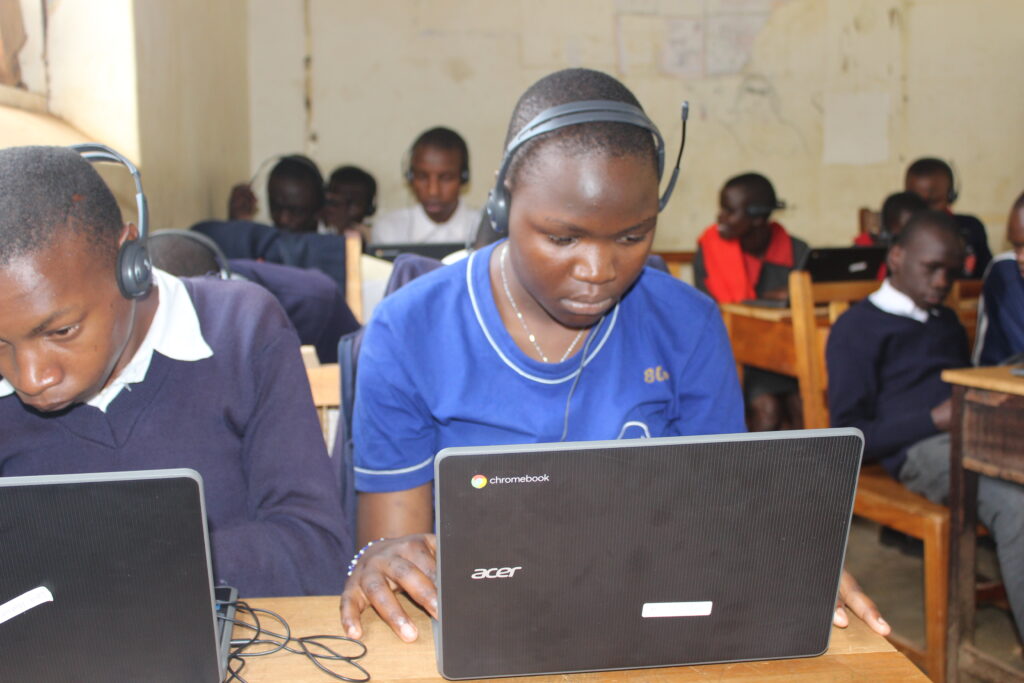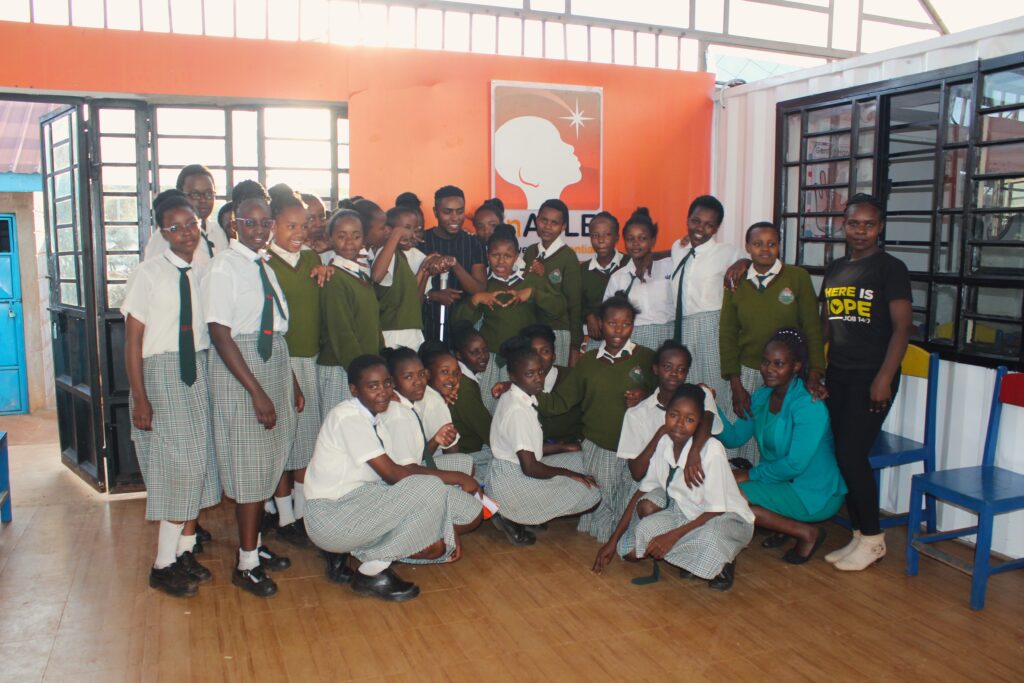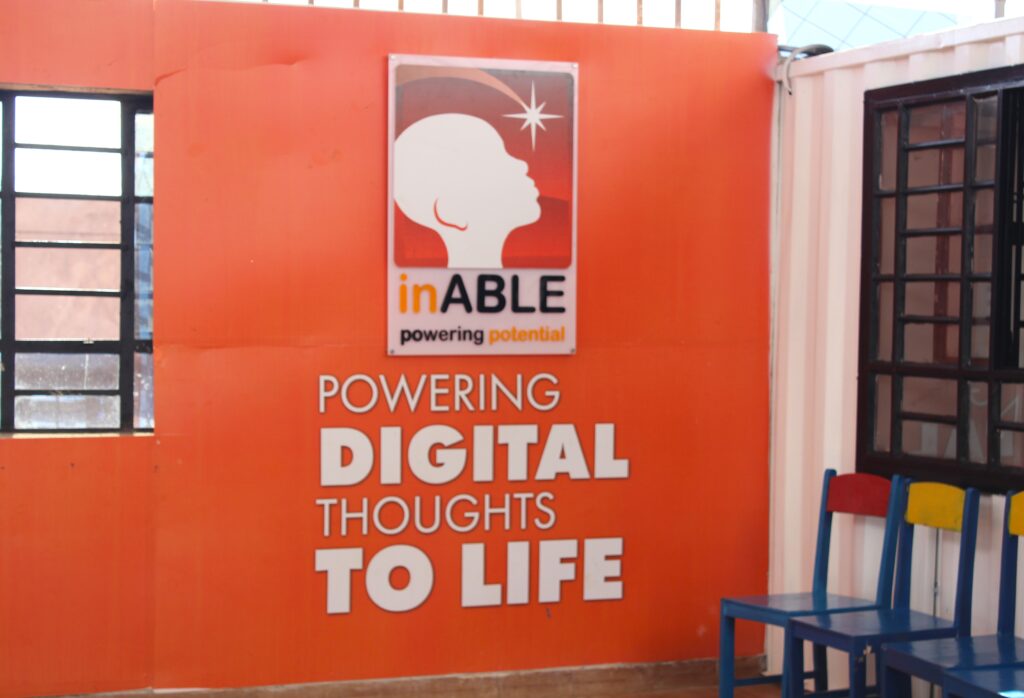Google Equips inABLE Instructors with Chromebook Accessibility Skills
inableAdmin
inABLE is excited to announce a collaborative initiative with Google that saw our computer instructors equipped with the knowledge to unlock the Chromebook’s potential for our students.
The Google team conducted a comprehensive training session, focusing on features specifically designed to assist visually impaired users. Instructors learned how to integrate ChromeVox, the built-in screen reader, allowing students to navigate and interact with their Chromebooks through spoken feedback. The training also covered essential keyboard shortcuts for efficient navigation, magnification tools for low-vision users to enlarge text and images, and in-depth customization options to adjust settings for individual accessibility needs, including contrast, font sizes, and cursor settings.

A picture of students wearing headphones and using Chromebook laptops during a lesson. They’re seated inside a classroom at Thika School For The Blind.
According to Shadrack Otieno, one of our computer instructors and a beneficiary of the training, “The training was refreshing and full of activities that enabled us to discover vital accessibility features of the Chromebook, especially for low vision and blind users. During the training session, I learned to access key accessibility settings using keyboard keystrokes, color inversion, screen magnification, dock magnification, ChromeVox tutorials, and web page navigation keystrokes. These features are crucial for visually impaired learners, making Chromebooks incredibly useful.”
This newfound knowledge empowers our instructors to guide visually impaired students effectively. Chromebooks are gateways to a wealth of online learning materials, enabling students to conduct research, take notes in class, and seamlessly receive and submit assignments through Google Classroom. These resources promise to transform the learning experience, making it interactive, engaging, and ultimately more effective in knowledge retention and academic performance.

A picture of a teacher and four students smiling and posing for a picture at Kang’aru Digital Hub
“The training has empowered us to create an inclusive learning environment. The Google team provided comprehensive training on the accessibility features of Chromebooks, focusing on how to assist visually impaired users in navigating and utilizing technology more effectively,” Eunice Kilungu, another instructor based at our Likoni School for the Blind station, asserts.
The impact extends beyond individual learning. Google Classroom fosters a collaborative online platform where students and teachers can ask questions, discuss topics, and create assignments, mirroring the traditional classroom environment. This platform actively encourages student participation in discussions and fosters a sense of engagement in completing assignments.

A picture that includes Evelyn Omollo, Julius Mbura, Valary Olesia and high school students smiling and posing for a picture inside Kang’aru Digital Hub.
James Kosgey confirms this. He says, “Initially challenging, the training opened my mind to new ideas and how to better utilize the laptop resources. It was exciting to learn more about Google Classroom that enables learners to access reading materials from the internet, take notes in class, and receive and send assignments.”
Accessibility features cater to a range of visual impairments. Chromebook allows students with low vision to magnify text and enlarge the cursor for a more comfortable viewing experience. ChromeVox and specific keyboard commands empower blind students to interact with Chromebooks and navigate the digital world.

A picture of an orange wall with an inABLE logo written powering Potential inside Kang’aru Digital Hub. It has additional text written, powering digital thoughts to life.
The instructors have witnessed firsthand the positive impact of Chromebooks, which were introduced to inABLE beneficiaries during the COVID-19 lockdown period. Student participation in lessons and activities increased, fostering a dynamic learning environment with positive interactions between teachers and students. Equipping our instructors and students with the necessary tools and knowledge opens doors to a brighter future filled with opportunity and academic success.
Looking ahead, inABLE is excited about the future possibilities. We are committed to expanding this program to reach visually impaired students across the nation. We envision collaborating with the Kenya National Examination Council to advocate for using technology during exams, creating a level playing field for all learners.
By Lily Ronoh-Waweru, Multimedia Storyteller